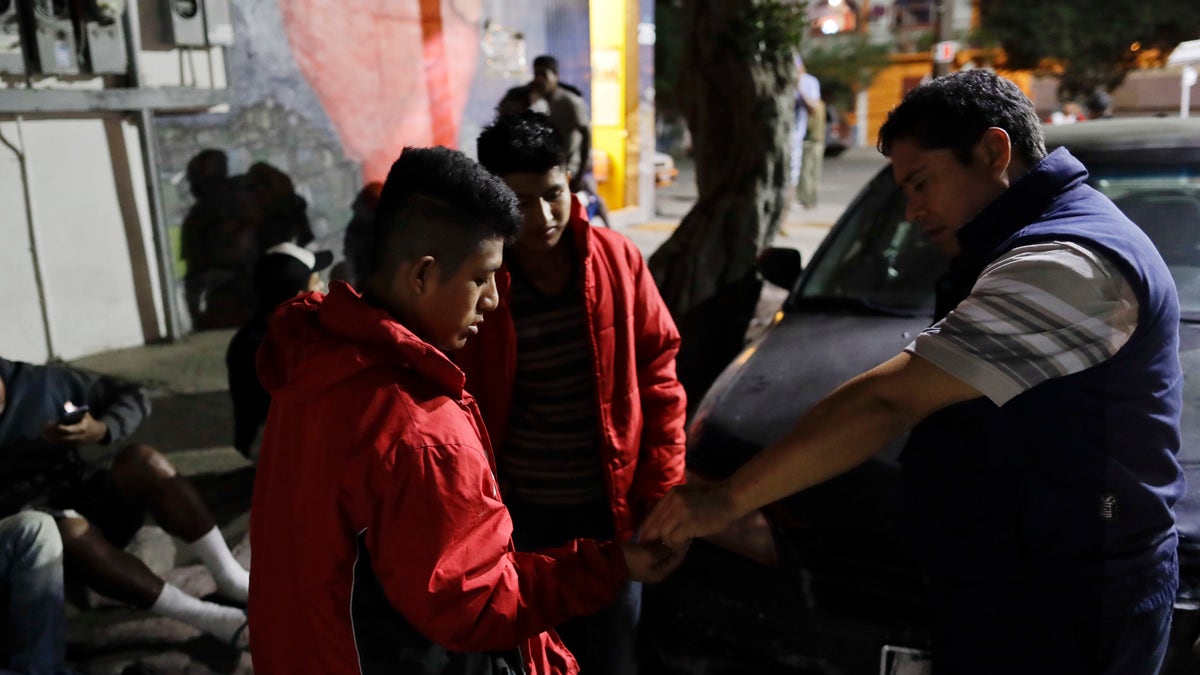
Men from Guatemala on their way to cross into the United States Nov. 14, 2016, in Tijuana, Mexico. (ap)
Mexico is bracing for millions of undocumented immigrants who they expect to return to their country once President-elect Donald Trump assumes office.
But some are warning that those who return to the country are likely to cause problems there.
“What's going to happen is that these individuals are going to return back to Mexico and they have no jobs, so they are going to feed the ranks of the cartels there," said Mike Vigil, former chief of international operations for the U.S. Drug Enforcement Administration and author of the book "Metal Coffins: The Blood Alliance Cartel."
Four years ago, the U.S. government estimated about 1.9 million immigrants were criminals and could face deportation. Of those, 820,000 of those were in the United States illegally.
Now, under the proposals put forward by Trump, Mexico fears many of the jobless deportees will end up swelling the ranks of drug cartels, sparking even more violence.
But Vigil warned that this increased violence could cause a tsunami of undocumented immigrants coming into the United States, “probably much more so than what he could actually deport," he said.
Many in Mexico believe Trump will have to moderate his plans.
"Political reality will make it clear that many of the proposals against Mexicans are simply not feasible, neither the deportation of all undocumented migrants, nor the construction of the wall," the Roman Catholic Archdiocese of Mexico City wrote in an editorial.
While millions of migrants in the United States illegally could ultimately face deportation, the process to find and deport all of them likely won't happen rapidly.
Once in office, Trump could move to have immigration agents quickly start arresting people already under orders to leave for being in the U.S. illegally. There were about 88,000 people in that category as of 2015.
But for immigrants with no criminal history, the wait for a judge's final deportation order could take years. There are about 521,000 cases pending in federal immigration courts currently, according to public data obtained by Transaction Records Access Clearinghouse at Syracuse University.
Remittances are another issue of concern, since under a Trump presidency Mexico might lose some of the billions of dollars sent home annually by immigrants working in the U.S.
Migrants sent home almost $25 billion in remittances to Mexico in 2015, and experts say most of that went to support the most basic needs of the poorest Mexicans.
Mexico already has a shortfall of 800,000 new jobs for youths who join the labor force each year, let alone returning migrants, said Alejandra Barrales, head of the leftist Democratic Revolution Party. "We need to close ranks and create (job) opportunities, not just for people who might be deported, but for the 1.2 million young people who join the labor market each year."
The federal government announced an emergency program this week aimed at encouraging business to hire returning migrants, but Mexico City teacher Armando Osorio doubted that would be enough, given the government's poor track record on job creation.
"These people have no moral authority to say they will receive their countrymen with open arms," he said. "They are the ones who are mainly responsible for the forced exodus of millions of Mexicans who don't have enough to eat."
Even if Trump seems to be walking back the idea of mass deportations, the prospect still remains frightening for people in Mexico.
On Sunday, Trump said in an interview on the news program "60 Minutes" that "what we are going to do is get the people that are criminal and have criminal records, gang members, drug dealers, a lot of these people — probably two million, it could be three million — and getting them out of our country."
Based on reporting by the Associated Press.
Like us on Facebook












































